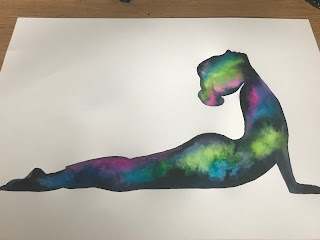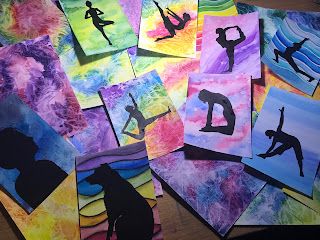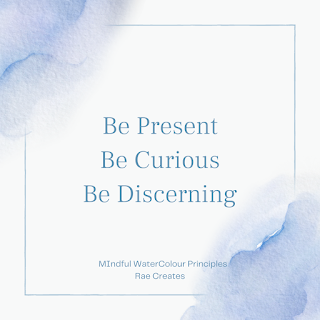What is Mindful WaterColours?
- Rae Creates
- Jan 13, 2023
- 4 min read
Short answer: A mindfulness based approach to creating with water colours.
Shortest blog post ever!
If you want a bit more detail, read on.
I developed this approach in a period of time when creating felt both essential and impossible. Initially I simply found a path that allowed me to create. Looking back, waht I did was identify what was stopping me and find a way around it.
I had hit a point where I was so self critical that I couldn’t create or I couldnt find any inspiration to paint. I took away my ability to sabotauge myself by being critical by painting patterns. I didn’t paint ‘things’ objects or anything representational. I also didn’t create patterns that were synmetrical. This allowed me to just create, without any pressure. When I had no inspiration, I would pick a shape and paint. It sounds simple and in a way it was; it was also hard to break the cycle of self criticism and that awful grey, bleurgh feeling of being uninspired.
I made it easier to succeed. I built the potential for success. Success became putting paintbrush to paper and creating a pattern of some sort or creating a background using different techniques. I had quite a collection. I used silhouette shapes of all sorts of things and filled them with patterns-I particularly liked aurora-borealis inspired skies.
Initially I moved far away from anything recognisable and I stopped drawing things first as a way to loosen up and let go a little.
Bit by bit, I danced in and out of creating whimsical but recognisable elements like mushrooms, cacti, cups, fish, birds and owls. Each time though, I let myself rest, returning to creating spirals and overlapping rectangles, rainbow waves and patterns with lines.
I found I could draw and still be loose. I taught myself to let go of being viciously critical of what I created. Seeing the ‘oops’ moments and things I didn’t like as building blocks to knowing more about what I did like and what worked for me. This acceptance of creating things I didnt like began with the idea of letting go of judgements but over time it grew into accepting and being discerning.
I found that this approach wove its way into pretty much all of my creative endeavours and that I was able to immerse myself in being fully present. I’m going to say that again. In being fully present. For me this is one of the fundamentals of my mindful practice
Over time I arrived at a solid core of three principles:
Be present
Be curious (this began as observe with curiosity)
Be discerning (this began as let go of judgements)
These principles are based in mindfulness but adapted to suit artists and creatives. The first is directly from the ideas and teachings of mindfulness. Being present.
When I am present I am really in my body, seeing the paint, feeling the brush in my hands, hearing the sound of the bristles. I am not focused on what is next or what happened a moment ago or yesterday. I am present.
It sounds really simple, like way too simple, but actually for me it was hard. I had a busy brain that didn’t like to let go, one that could take any quiet opportunity as space to fill with thoughts. I used techniques like saying what I was doing, in my head and out-loud. It’s harder to think two thoughts at once. I painted with music on, I painted with mindless TV on. Both of these became like white noise and almost gave my brain something else to focus on. I was gentle with myself, really gentle, and didn’t expect that I would perfect being present in a day or a week or a year or ever in fact. It’s a work in progress.
If my mind started moving towards other thoughts I gently moved them back. Sometimes I’d write a big list. Not a to do list, more of a ‘these are all the things in my head right now’ list. It wasn’t a list I had any commitment to crossing off or coming back to. It was simply a way of convincing my brain it didn’t need to hold onto all of that information. Sometimes I journaled before I tried to paint: free journalling, a little like Julia Cameron’s morning pages. Simply a way to empty or reduce some of the thoughts in my mind.
I added into my ‘being present’ the idea of observing with curiosity. I rediscovered that paints could be amazingly beautiful. That the flow of water, the patterns created by salt were all so satisfying. I became curious and in a slightly scientific way more playful as i re-explored paints and supplies.
I found that I had re-framed my ‘That looks awful’ to ‘my eye is being pulled to that and I don’t want it to’. It made a big difference to allow myself to not like the end result but to still have enjoyed the process. I had, without really thinking, added in the idea of not judging my efforts.
That isn’t to say I always liked the end results. Liking or not liking just wasn’t a judgement of how ‘good’ or ‘bad’ I was at painting or art. It was simply me finding out more about what I did and did not like.
All of this was done without me having thought of the word mindfulness really. I found it meditative. In fact, it is what is termed informal or active meditation (where you are doing something with your focus being fully on that task).
As I read more and found out more I realised that the approach I was using was based in mindfulness hence I decided to call it mindful watercolours.
If you want to hear me share this part of my journey, here is a video I made a few years ago to do exactly that.






Comments